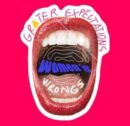Truthfully, it is difficult to articulate in words the thoughts and feelings which weigh on my mind daily. It is difficult to articulate that which I do not have the guts to express aloud because I know that I would simply start crying to myself even if I tried.
Simply put, I feel isolated. Not in the lonely sense of the word, but as a fact. And while living in America, the UK, and Kazakhstan has undoubtedly taught me a lot about myself, these experiences only perpetuate this sense of isolation. But even such words do not really encapsulate what I feel, want and need to express.
Because what I want to say is that it is nice and somehow a bit cute how everyone here thinks I’m Kazakh. Usually I do not categorize myself and am not categorized by others as part of a larger whole. But here, even though I am actually a foreigner, I can often pass as Kazakh and completely bypass the whole “where are you from” conversation, which I’m more accustomed to in America and London, where any hint of non-whiteness suggests traces of foreign elements, no matter how long you live there.
But such comfort is inseparable from the simultaneous reality that I constantly feel like an imposter because I am not actually Kazakh nor can I speak the language, even if that’s the story my face may seem to tell. As a result, I feel more pressure to speak perfect Russian (or Kazakh) because I know that is what the person on the receiving end expects.
And such interactions only bring me back to feelings of displacement and insufficiency intertwined with my mixed race identity, yet again forcing me to face myself and how I view myself. Since moving to Kazakhstan, I have never felt so close to my identity and yet so far away from it at the same time.
—
What I mean to say is that I sometimes feel guilty speaking Russian everyday while my proficiency in Korean remains more or less stagnant in comparison.
What I want to say is that it’s been two years since 할머니 passed away and every day since I feel and fear that I am drifting further and further away from my Korean identity. Now, hardly seeing my Korean family and having no Korean friends, it’s becoming steadily harder to identify the Korean bits of myself which I know are there, but somehow feel invalid at times.
In Astana, I fear that I am not devoting enough time towards preserving and fostering my Korean identity because I have thrown myself into another language and culture. It is here, so far from family and good Korean food, that I feel farthest from a key part of myself.
But within this fear of losing a crucial part of myself, I have also never felt closer to the Korean part of my identity, if such a dichotomy is possible. Never before have I felt such an intense longing for my childhood, for the time of my life where every holiday I was surrounded by Korean family and Korean food, for the time when I didn’t even question or think about whether I was Korean or not. I simply was in my own way and that was enough.
But even that is not all.
Because I also want to say that I hate the American stereotype. But in some ways, I am a walking American stereotype. Save for a sprinkling of Korean words and phrases, I was raised in a monolingual household and can only speak English fluently. But I, and others like me, did not choose this. Throughout America’s history, her people of color never chose to be bullied, disciplined, imprisoned, enslaved, or killed into submission, assimilation. And it is not as though the effects of such cultural violence are not felt today. Because I feel it, and many others do too.
I don’t expect most non-Americans, and even white Americans, to understand this because what I’ve also realized while living abroad is just how whitewashed of a country it is both from the point of view of Americans and even more so from the perspective of non-Americans. Really, it’s a shame America’s people of color often are not given any thought at all because they form a key pillar of what America really is.
I’m no American patriot, but sometimes others’ ignorance is so palpable and it saddens me how whitewashed our perceptions are. Every “where are you really from” or “you don’t look American” only reinforces the reality that I do not even properly belong in the country I was born and raised in because we have been brainwashed to believe that it is only white people who belong there, as they are the only people who do not have to answer to such remarks.
But America’s (and the world’s) multitude of identities deserve to be remembered, and not just by those within a given community. And perhaps that is part of why I am writing here – to assert that I exist, so as not to get lost in the whitewashed discourse and assumptions that follow me everywhere I go.
What I want to say is that I know there is no country for me, where I will fit in perfectly and be part of the whole. And I wouldn’t change anything about that. And while I have never felt more isolated as I do now, I have also never felt more proud of who I actually am. Because where is the sense in worrying about everything I am not when I am already a whole person?
So, this is who I am and how I feel in this place and in this moment, and that is enough.
